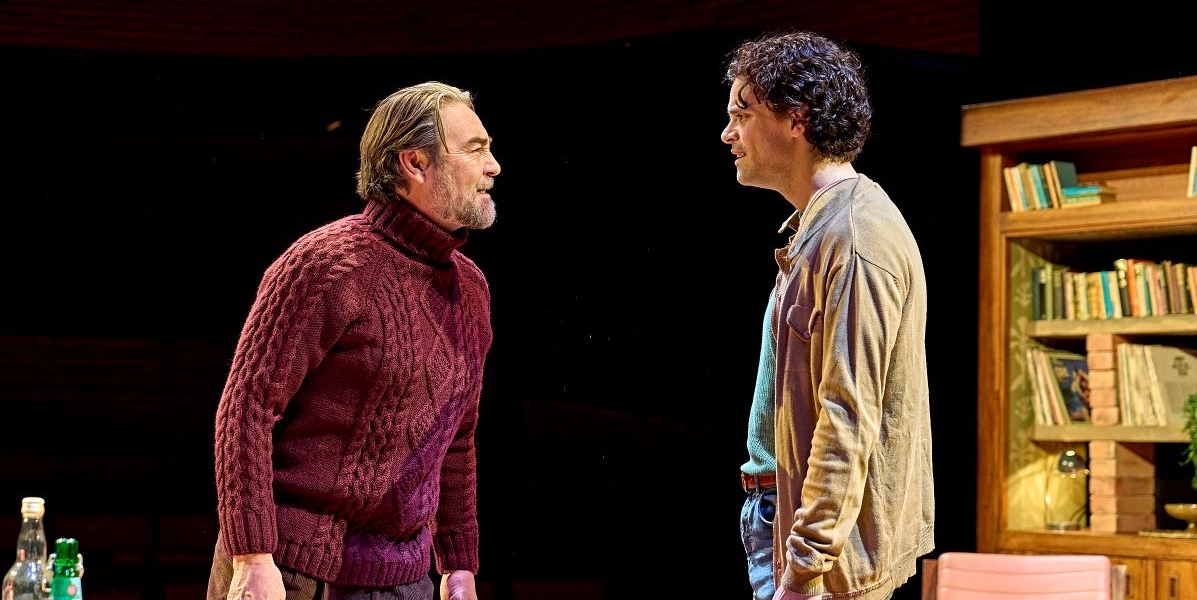This play was originally produced at the Royal Court back in 2006 and now returns to Hampstead at Stoppard’s suggestion. It is a welcome revival: the moral issues at the play’s heart are if anything even more salient now than before, and there is a warmth and heart about the interplay of characters and situations that belies this author’s reputation for somewhat chilly conceptual gymnastics.
The theatre is arranged in traverse, which gives the cast a great deal of dynamic flexibility on the huge apron of stage, but at the occasional expense of audibility. At one side is a wall of books and LPs that we later identify with a flat in Prague, and at the other the outside wall of summerhouse extension, which we learn is part of a plush, professorial residence in Cambridge. The space in between is populated with the furniture and paraphernalia of both these homes with scene changes covered by lavish chunks of ‘Rock & Roll’ music, itself a central part of the drama.
The action takes us from 1968 through to 1990, from the invasion of Czechoslovakia through to the Velvet Revolution. We follow two narratives that intertwine. At the start of the play, Jan, a young philosophy student, is spending a summer in Cambridge to work with an unreconstructed Marxist professor, Max. Jan is also getting close to his host’s daughter, Esme, who is embracing flower power, while Eleanor, Max’s wife struggles with cancer while continuing to teach Sappho to students. Jan returns to Prague and his over-optimism about the prospects for retaining freedom after the Russian invasion is gradually eroded as he cannot remain above or immune from the politics of the day where the choices lay between being a dissident or a stooge of the regime. Everyone’s certainties are ultimately eroded. A reunion after the Velvet Revolution reveals how confused both actions and motives have been, and no one is satisfied with the choices made, even though the prospects of a happier ending are not entirely over.
There are some important themes in play here, and director Nina Raine and her cast play these for all they worth. In dialogue worthy of Shaw, the merits and morality of taking a stand are thoroughly debated in a way that is still highly pertinent today. Is this ultimately the only honourable course of action? Or does it only amount to vainglorious grandstanding? And is the price for principle paid as much or more by family and friends as by the potential hero? But there is a lot of humour and layered characterisation on view here that saves the text from coming over as dogmatic or preachy.
Jacob Fortune-Lloyd looks like a young Tom Stoppard, curly hair and plummy English accent and all. He has an exquisite politeness and slight diffidence that is just right for this role; but his passionate commitment to rock music and to its quirkier manifestations of individualism – ‘The Plastic People of the Universe’ – comes through clearly too. Equally eccentric, in a different way, is Max’s devotion to Communism and the Communist Party. Nathaniel Parker is excellent here in playing a stubborn man of ideas, aware he may deluded by dialectic but rightly wary of the triumph of individualism. Nancy Carroll turns in two superb performances as both Eleanor and (older) Esme, both in many ways the victims of Max’s self-regard. As Eleanor she literally embodies defiance of the cancer that is destroying her while also demonstrating rigorous devotion to precision and passion in learning. Her portrayal of the middle-aged daughter captures with equal precision the vagueness and spasmodic randomness of someone who has never quite recovered from the 60s.
The supporting roles are played with equal attention to detail. Phoebe Horn invests young Esme and Esme’s daughter Alice with equal youthful ardour, but neatly separated by the differences of two generations. Colin Tierney provides two delightfully contrasted portrayals – Milan, a sinister and opaque Czech policeman, and Nigel, Esme’s manipulative and garrulous journalist ex-husband. Hasan Dixon, Anna Kippa, Georgia Landers, Emily Mytton, and Brenock O’Connor, all deliver sharply-etched character portraits whether in Cambridge or Prague.
The one part of the drama that does not work so well for me is the subterranean love affair that bursts into prominence in the final five minutes. This seems to me to be an after-thought in every sense of the term, under-written to the point of invisibility for much of the action. While a batch of happy endings is by no means impossible, let alone undesirable, as the culmination of the play, this one seems unearned and under-prepared.
However, the evening as a whole is thoroughly enjoyable, full of intellectual stimulus and understated poignancy – definitely deserving of a revival. Indeed it could be seen as the ideal show for this time of year, if you wish to avoid the more predictable seasonal fare. For those of us of a certain age the music alone will be sufficient.

